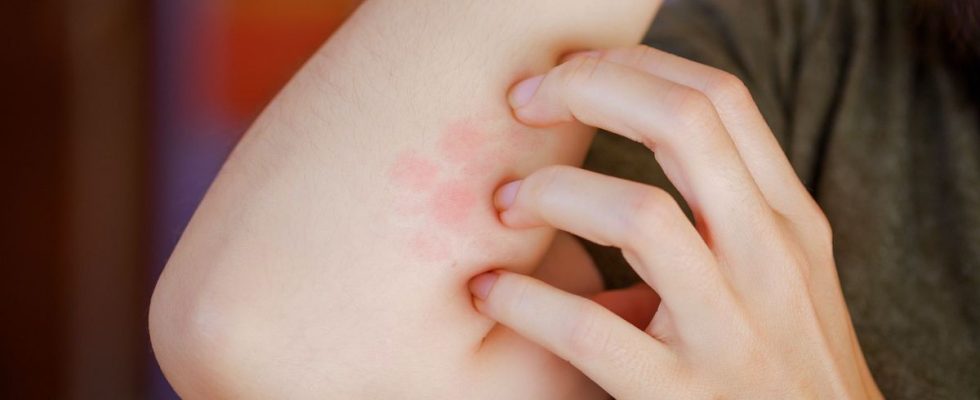Published on
Updated
Reading 3 mins.
Ringworm, a highly contagious skin infection caused by a fungus, was discovered in two American patients in New York. With one particularity: the two cases are resistant to the usual treatments. Health authorities fear that this situation will spread.
Will a microscopic fungus turn our lives upside down? In a report released Thursday, the US Centers for Disease Control and Prevention reported the first known cases of antifungal-resistant ringworm.
Ringworm, an infection caused by 40 species of fungi
Despite its name, ringworm is not caused by a worm: it is a skin infection caused by one of 40 species of microscopic fungi that eat the keratin of the so-called stratum corneum. In this case, the infections were caused by Trichophyton indotineae, a fungus recently discovered in South Asia, then in European countries. These are the first known American cases.
Ringworm can take many forms, but often causes what looks like a superficial rash that forms a ring around normal-looking skin. It is a very uncomfortable, itchy rash that is usually treated with an antifungal taken over several weeks.
One case detected in a traveler, the other in a woman who had not moved
The two resistant cases were reported in 2021 and 2022 on two women.
- The first patient, 28, who had not traveled (suggesting local spread), developed the rash in the summer of 2021. The report says the woman had “large annular, scaly, itchy patches” on the neck, stomach, pubic area and buttocks. The first-line treatment in this case is oral therapy with terbinafine, a common antifungal, which she began taking in January 2022. But two weeks later, no improvement seemed to relieve the young woman. The doctors put her on itraconazole, a liquid medicine usually used to treat yeast infections of the mouth and throat, which took only 4 weeks to work. Doctors are still watching her.
- The second patient, a 47-year-old woman, developed a rash on her thighs and buttocks during a visit to Bangladesh in the summer of 2022. Put on topical antifungal and steroid cream, the rash did not appear to move. Back in the United States, same observation while several creams and treatments were tested. Oral terbinafine did not work either. Things improved after treating the patient to a four-week course of griseofulvin, a drug used to treat athlete’s foot and fungal infections of the scalp.
Warming and globalization at the origin of more resistant cases?
Although ringworm is a benign condition, its contagion is a concern, especially if treatments now prove ineffective. That’s why the Prevention Center is raising the alarm today and urging healthcare professionals to contact their state or local public health department if a rash does not respond to first-line treatments, so cases can be further tested. . “Antimicrobial stewardship efforts are critical to minimizing the misuse and overuse of prescribed and over-the-counter antifungal medications and corticosteroids,” indicates the report.
The situation obviously involves an underlying health issue: are these two cases isolated? Or the sign of a contagion already in progress? And does the local case indicate an epidemiological change in this ringworm? A question raised by Dr. Priya Soni, specialist in pediatric infectious diseases at Cedars-Sinai Medical Center in Los Angeles, in CNN Health.
“This fungus may be a little more widespread than we have noted before, (…) I think it is important to be aware that we may see more of this particular species as we enter the months hotter and wetter summers. ATWith globalization and just the travel we’re going to see over the summer, that might be something we’ll see more and more of as the months go on.”
Ringworm Precautions
In the United States, the CDC also encourages doctors to educate patients on how to prevent the spread of ringworm. Hygiene advice is recommended in particular:
- Do not share clothes, combs or hats with people who have a rash;
- Dry your feet well between the shower wearing socks and shoes to avoid humidity;
- Respect good hand hygiene, especially because the fungal infection is transmitted from skin to skin;
- Also wash your hands after gardening or petting an animal.
Simple gestures to adopt, especially if you are traveling.
